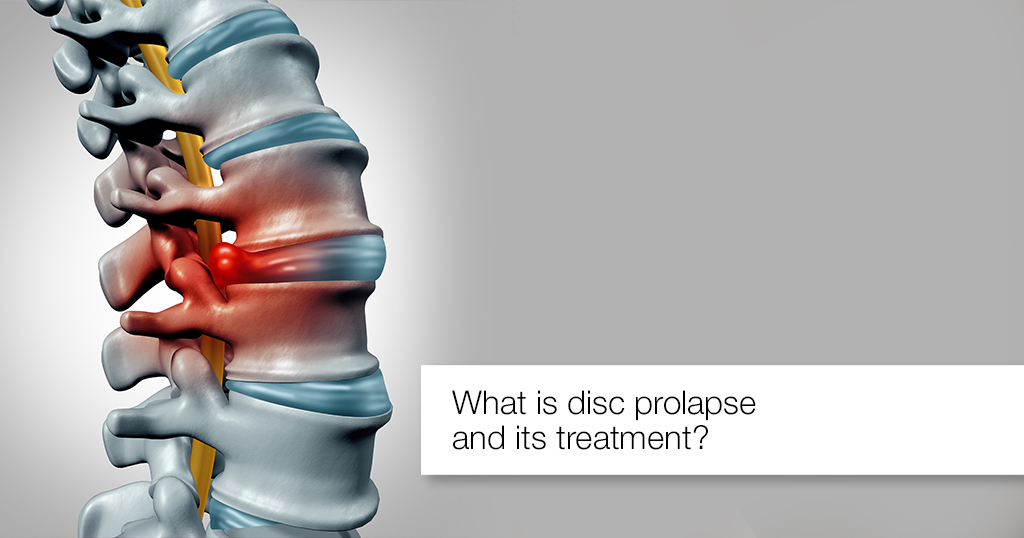Disc Prolapse or Herniated Disk
A disc Prolapse or a Herniated disc is a problem in the rubbery cushions or discs that sit between the individual bones, known as vertebrae, which stack to make the spine. The spinal disc is quite soft and has a jelly-like center nucleus where it is encased in the rubbery exterior or annulus. In a ruptured disc or a herniated disc this nucleus is pushed out through a tear in the annulus. This herniated disc is something which can occur at any part of the spine. When there is a herniated disc, it can easily irritate a nearby nerve and depending on this, there can be pain, numbness or weakness in the arm or leg or area supplied by that nerve . It generally happens in the legs. You don’t necessarily need surgery to relieve the problem unless it is very severe.
Symptoms of disc prolapse
When you have a lot of pain in the lower back or in the neck, it can be due to disc prolapse. The signs appear as the prolapse presses the nerve. They also affect only one side of the body either left or on the right side.
- You may have immense pain in your arm or leg and if it is the leg, the pain shoots from the lower back and if it is in the arm, the pain shoots from the neck. You will feel the pain when you sneeze or cough or move.
- You may have a little bit of numbness. If you ever feel a tingling sensation or numbness, then it means that part is heavily affected and the nerves are suppressed due to the prolapse.
- There is a prolonged weakness and if this is so, you need to visit the doctor immediately. Muscles are often weakened by the nerves and this may cause you to fall frequently or simply have the inability to lift heavy items.
You need to see the doctor when the neck or the back pain travels down your arm or leg and also if you have numbness or severe weakness.
Causes of disc prolapse
This can be because of the gradual, age related wear and tear of the disc. It can also be caused due to disc degeneration. As you grow older, the discs of the spinal cord become less flexible and they are more vulnerable. Hence, when there is a lot of wear and tear, herniation of the disc can happen. There are very rare causes where a heavy fall or blow can be the cause of disc prolapse.
However, there are quite a few risk factors and some of them are given below:
- Obesity can be the cause of the extra stress.
- If you are in that occupation where it is physically demanding and you need to lift heavy weights, you may have this problem.
- Extensive wear and tear of the back can also be the cause of disc prolapse.
- When you smoke heavily, it reduces the oxygen supply to your disc and thus it causes the disc to break down easily.
Complications of disc prolapse
When you are having the problem of the herniated disc, then there are complications that are bound to happen.
Complications can include intense symptoms, saddle anesthesia where there is a loss of sensation or there is bowel dysfunction.
Diagnosis on disc prolapse
The best way to diagnose this condition is through tests. Also, some neurological tests will be done to check the reflexes, muscle strength, the way you walk, and the ability of how you feel small touches or vibrations .
To be sure that you suffer from no other condition, other tests like X rays, CT scan, and MRI are also advised. They are used to rule out any other causes of back pain or get some cross-sectional images of the spinal column.
Sometimes a Myelogram may also be required , where a dye is injected in the spinal fluid and it can help in showing the pressure on the spinal cord or on the nerves.
Treatment for disc prolapse
There are many ways to treat this condition and surgery is the last resort. Conservative treatment includes rest where you can avoid the movement that causes the pain. It also relieves the symptoms in a few weeks . Pain medications like Ibuprofen, Naproxen Sodium, Acetaminophen etc may be given too.
Cortisone injections at the affected area may be needed sometimes .
Physiotherapy is needed and you will be taught exercises and positions to minimize the pain of the herniated disc.
Discectomy is used as the last resort. If the numbness or pain doesn’t go away in six weeks, then this procedure may be done.
Prevention on disc prolapse
One of the best things to prevent disc prolapse is to always maintain a good posture . Also, do some regular exercise as this strengthens the trunk muscles and they support the spine properly. You can also practice Yoga which will help to strengthen the spine. Maintain a good posture and keep your back straight as much as possible. When you are sitting for long periods, make sure you do this for sure. While lifting heavy weights, don’t put much stress on your back but try to put more weight on your legs. Excess weight adds more pressure to the back a well as legs which is why it will pain more when you have herniated disc. Hence, keep extra weight at bay by eating good food and exercising regularly. Do not smoke and find ways to quit the habit as soon as possible.
Conclusion
It is essential to adopt the necessary lifestyle measures to keep this condition at bay. Be fit and try quitting smoking to stay healthy.


















